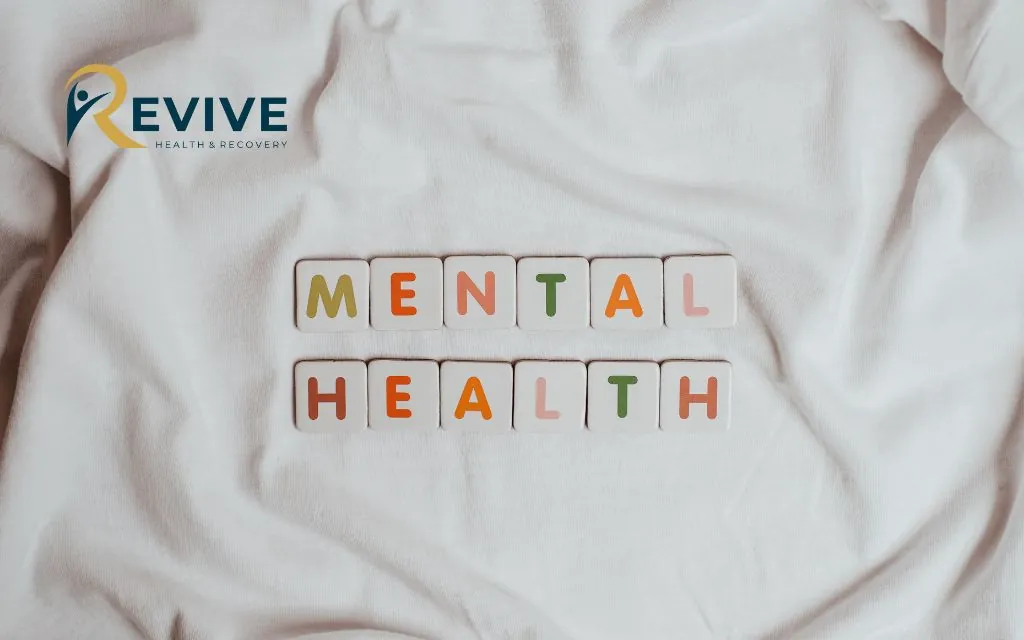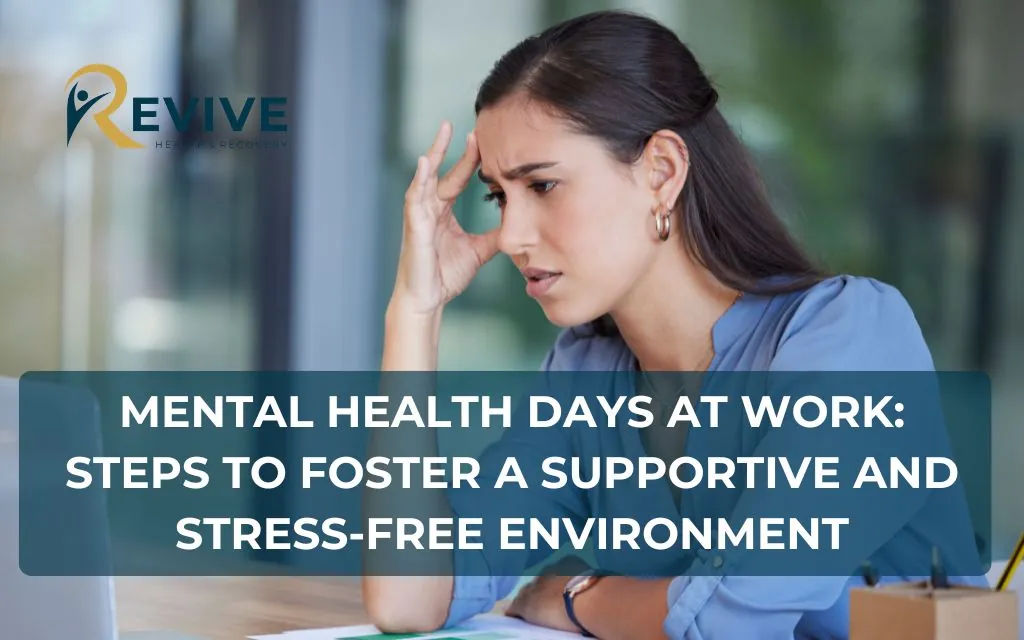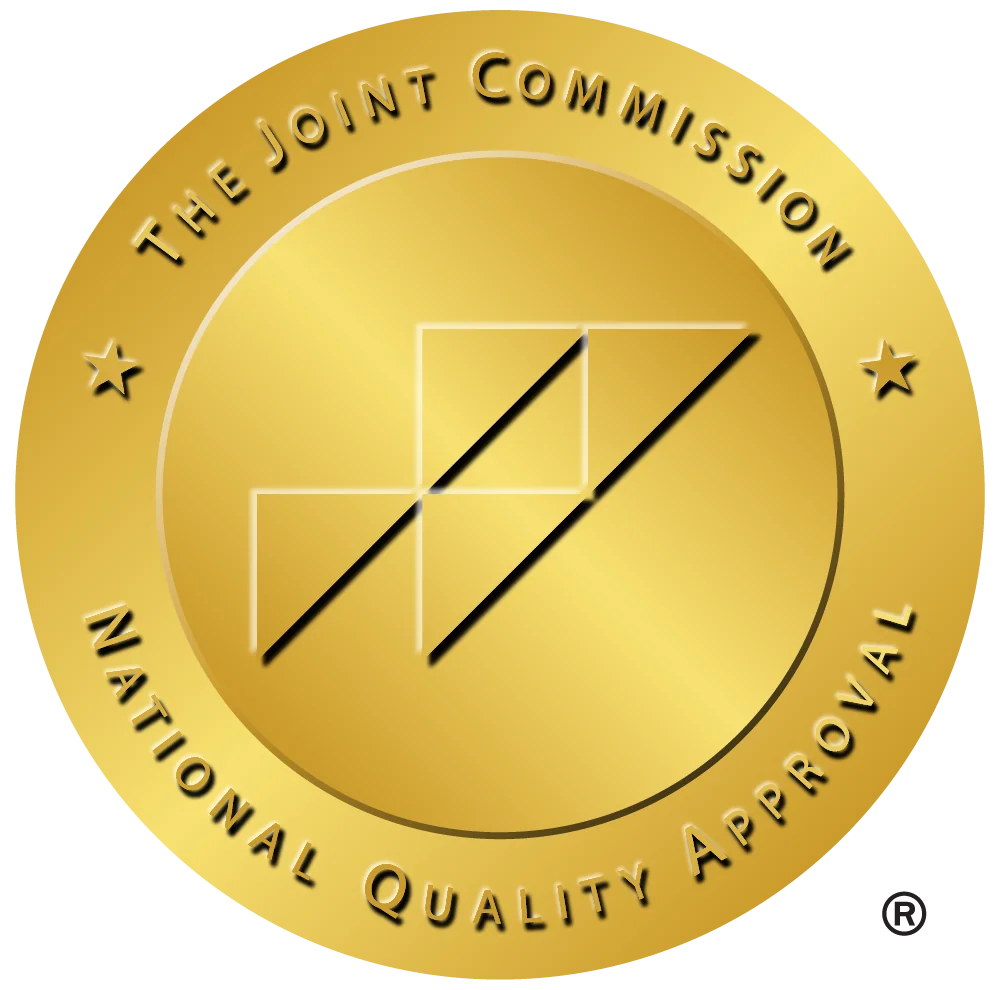Balancing work and personal well-being can be tough, especially with today’s busy schedules. That’s why the idea of mental health days at work is becoming more popular. A mental health day isn’t about skipping out on responsibilities—it’s about taking a break to recharge and protect your emotional health. When employees take care of their mental well-being, they’re more productive, focused, and happier in the long run.
Employers are also starting to see how important mental health is for workplace success. Taking a day to relax, reset, or handle personal challenges can strengthen individuals and teams.
In Denver, Colorado, places like Revive Health Recovery emphasize the value of mental health in all parts of life, including work. They encourage a holistic approach to well-being that recognizes the importance of addressing workplace stress and personal challenges.
This article will discuss why mental health days at work are so important, how they help, and how workplaces can create a supportive culture that prioritizes mental health. Let’s explore these vital health topics and how it can make a difference for everyone.
What Are Mental Health Days at Work?
Definition and Purpose of Mental Health Days
Mental health days are specific days off that employees take to prioritize their psychological and emotional well-being. Unlike traditional sick days meant for physical ailments, mental health days address stress, anxiety, burnout, or other psychological stressors. These days provide an opportunity to decompress, reflect, and recharge. By stepping away from work responsibilities, employees can focus on restorative activities, regain balance, and return with renewed energy.
The purpose of mental health days at work extends beyond individual care. They encourage a culture of openness about mental health, reduce stigma, and normalize the idea that mental well-being is just as important as physical health. Revive Health Recovery in Denver emphasizes that acknowledging mental health needs can prevent more severe mental health crises, promoting overall resilience.

The Difference Between Burnout and Mental Health Crises
While burnout and mental health crises share some similarities, they are distinct challenges. Burnout typically results from prolonged stress in the workplace, characterized by exhaustion, cynicism, and reduced performance. It often develops over time and signals the need for rest and reevaluation of priorities. In contrast, mental health crises may involve acute issues like severe anxiety, panic attacks, or depressive episodes that require immediate attention and intervention.
Understanding these differences is vital for employees and employers. Mental health days at work can be a preventative measure against burnout, offering employees a chance to decompress before reaching a breaking point. For crises, however, professional support from organizations like Revive Health Recovery may be necessary to address deeper underlying issues.
Why Employers Should Support Mental Health Days at Work?
Benefits to Employee Well-Being
Supporting mental health days at work creates a healthier, more engaged workforce. Employees who feel supported in their mental health are more likely to remain loyal, motivated, and productive. Mental health days provide an opportunity to step away from stressors, leading to improved emotional regulation and overall well-being. This aligns with the importance of mental health at work, which directly impacts both individual and organizational success.
Improved Focus and Productivity
When employees take time to address their mental health, they return to work with greater focus and efficiency. Prolonged stress can impair cognitive function, making it difficult to concentrate or complete tasks effectively. A well-timed mental health day allows employees to recharge, enhancing their ability to tackle challenges with clarity and determination.
Reduced Workplace Conflict
Stress and burnout can lead to irritability, miscommunication, and interpersonal conflicts in the workplace. Encouraging mental health days at work helps mitigate these issues, fostering a more harmonious work environment. Employees who feel mentally balanced are more likely to collaborate effectively and maintain positive relationships with colleagues.

Long-Term Organizational Gains
Beyond individual benefits, mental health days at work contribute to long-term organizational success. Companies that prioritize mental health see lower turnover rates, fewer absenteeism issues, and a more resilient workforce. Additionally, a reputation for supporting employee well-being can attract top talent. Revive Health Recovery advocates for businesses in Denver to adopt such policies, recognizing their role in creating thriving communities.
How to Recognize When You Need Mental Health Days at Work
Common Signs of Burnout
Recognizing the signs of burnout is the first step in understanding when a mental health day is necessary. Burnout often manifests as chronic fatigue, reduced motivation, and feelings of detachment from work. Without intervention, these symptoms can escalate, leading to decreased performance and overall dissatisfaction.
Physical Symptoms of Stress
Stress doesn’t only impact the mind; it can take a physical toll as well. Symptoms like headaches, muscle tension, insomnia, and digestive issues may indicate the need for rest and self-care. Ignoring these signs can exacerbate health problems over time.
Emotional Exhaustion and Detachment
Emotional exhaustion often accompanies burnout, leaving individuals feeling drained and unable to connect with their work or colleagues. This detachment can make it challenging to find fulfillment in tasks that once brought satisfaction. Taking a mental health day can help restore emotional balance and perspective.
Differentiating Between Fatigue and Overwhelm
It’s essential to distinguish between regular fatigue and overwhelming stress. While fatigue might be alleviated by rest or improved time management, feelings of overwhelm often signal deeper issues that require attention. Mental health days provide the space needed to address these challenges proactively.

Steps to Take Mental Health Days at Work
Planning and Communicating With Employers
Taking mental health days at work begins with clear communication. Employees should approach their supervisors or HR departments honestly, framing their request within the context of maintaining productivity and long-term well-being. Many employers appreciate transparency and are willing to accommodate these needs.
Activities to Recharge and Reset
Once a mental health day is secured, it’s essential to use the time effectively. Engaging in activities that promote relaxation and rejuvenation can maximize the benefits of the day.
Restorative Practices
Practices like meditation, yoga, or pursuing hobbies can help reduce stress and foster a sense of peace. Spending time outdoors or engaging in creative activities allows individuals to reconnect with themselves and regain focus.
Seeking Support or Counseling
For those dealing with more significant challenges, seeking professional support can be transformative. Revive Health Recovery in Denver offers professional counseling and recovery services to help individuals navigate mental health challenges and build resilience.

Addressing Workplace Policies on Mental Health Days at Work
Navigating HR Guidelines
Understanding workplace policies regarding mental health days is crucial. Employees should familiarize themselves with HR guidelines and advocate for supportive policies if none exist. Open dialogues about mental health can lead to the implementation of more comprehensive benefits and accommodations.
Options for Unpaid Leave or FMLA
For employees facing more significant mental health challenges, options like unpaid leave or the Family and Medical Leave Act (FMLA) may be available. These programs provide the flexibility needed to address long-term issues without jeopardizing employment.
Revive Health Recovery in Denver, Colorado
In the vibrant city of Denver, Colorado, Revive Health Recovery has established itself as a cornerstone for promoting mental health and well-being. With a focus on holistic recovery and tailored care, the organization recognizes the critical role mental health plays in every aspect of life, including the workplace. As businesses increasingly acknowledge the importance of mental health days at work, Revive Health Recovery offers solutions that bridge the gap between individual needs and organizational goals. By addressing mental health challenges proactively, this institution contributes to building healthier communities and fostering workplace environments where employees can thrive.
Revive Health Recovery champions the idea that a mentally healthy workforce is a productive workforce. This philosophy aligns with modern approaches to workplace wellness, ensuring employees not only perform their best but also feel supported in their mental health journey. Through innovative programs and expert care, Revive Health Recovery plays a pivotal role in reshaping how mental health is addressed in Denver and beyond.
Supporting Employees Through Specialized Programs
One of the standout features of Revive Health Recovery is its commitment to providing specialized programs designed to meet the diverse needs of employees. These programs are structured to help individuals manage stress, navigate burnout, and address underlying mental health conditions that may hinder their professional and personal lives.
By offering services tailored to the unique pressures of workplace environments, Revive Health Recovery ensures that employees have access to the resources they need to stay mentally resilient.
For example, the center provides personalized counseling sessions aimed at tackling specific workplace stressors. Whether an employee is dealing with anxiety due to heavy workloads or interpersonal conflicts, the expert team at Revive Health Recovery offers practical tools and strategies to foster emotional balance. Additionally, group therapy sessions are available, allowing employees to connect with peers facing similar challenges. This sense of shared experience can significantly reduce feelings of isolation and promote a sense of community.

Revive Health Recovery also focuses on educating employees about recognizing early signs of mental health challenges. Through workshops and seminars, individuals learn how to identify symptoms of burnout, manage stress effectively, and take proactive steps toward self-care. These initiatives align closely with the importance of mental health at work, equipping employees with the knowledge and confidence to prioritize their well-being.
Integrating Workplace Wellness With Professional Care
Revive Health Recovery recognizes that true mental health support requires collaboration between workplaces and professional care providers. To this end, they have developed innovative approaches that integrate workplace wellness initiatives with specialized recovery services. This dual approach ensures employees receive comprehensive support that addresses immediate needs while fostering long-term mental health.
By partnering with local businesses, Revive Health Recovery helps employers create customized wellness programs that incorporate professional care options. For instance, they assist companies in developing policies that encourage mental health days at work, ensuring employees feel empowered to take time off when needed. These policies are complemented by resources such as on-site counseling sessions, access to virtual mental health consultations, and referrals for intensive care when necessary.
Additionally, Revive Health Recovery emphasizes the role of education in workplace wellness. They offer training for HR professionals and managers, equipping them to handle mental health concerns with empathy and effectiveness. This training helps create an organizational culture where employees feel comfortable discussing their mental health, leading to early intervention and better outcomes.
Integrating professional care with workplace wellness also benefits businesses directly. Companies that partner with Revive Health Recovery report improved employee retention rates, reduced absenteeism, and enhanced workplace morale. By investing in their employees’ mental health, these organizations not only fulfill a moral obligation but also enjoy tangible advantages in productivity and engagement.

Conclusion
Mental health days at work are no longer a luxury but a necessity in today’s demanding world. They provide an essential opportunity to recharge, prevent burnout, and promote long-term well-being. By recognizing the importance of mental health at work, both employees and employers can contribute to healthier, more productive environments.
In Denver, organizations like Revive Health Recovery stand at the forefront of advocating for mental health awareness and support. Encouraging employees to take proactive steps, such as mental health days, fosters a culture of care and resilience. Whether through restorative practices or seeking professional guidance, the benefits of taking mental health days at work are undeniable, paving the way for happier individuals and thriving workplaces.







